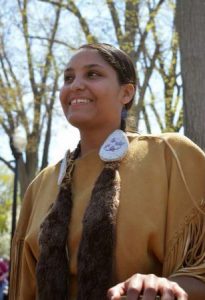On October 17, 2018, Cholena Smith, Shinnecock scholar and educator, brought her people's culture, history and traditions to Adelphi in honor of Native American Heritage Month in November and Indigenous Peoples' Day on October 8.
 by Choya Randolph, M.F.A. ’18
by Choya Randolph, M.F.A. ’18
Southampton, New York, on Long Island’s South Fork, is known for being a summer playground for the rich and famous. But it’s also home to approximately 700 members of the Shinnecock Indian Nation of Long Island. On October 17, 2018, Cholena Smith, Shinnecock scholar and educator, brought her people’s culture, history and traditions to Adelphi in honor of Native American Heritage Month in November and Indigenous Peoples’ Day on October 8.
“It’s about changing perspective,” said Smith, as she presented to an audience of students and faculty. “What’s our history, current and future? It’s very important to learn these histories.”
The event, “Native Culture, Traditions and the American Historical Narrative: Teaching About the Shinnecock Nation of Long Island,” was sponsored by the Department of History and cosponsored by the Department of Political Science, the Department of African, Black and Caribbean Studies, the College of Arts and Sciences, the Office of Diversity and Inclusion, the Ruth S. Ammon School of Education, the Collaboration Project, and Swirbul Libraries.
Associate Professor Cristina Zaccarini, Ph.D., decided to bring Smith to campus after she attended a history conference keynoted by Associate Professor Scott Manning Stevens, Ph.D., an Akwesasne Mohawk Nation citizen, scholar and director of Native American and Indigenous Studies at Syracuse University. History teachers from the tristate area asked how they would best be able to teach indigenous history.
“Our response was to invite Cholena Smith,” said Dr. Zaccarini. “Adelphi’s history department is committed to teaching a history of the indigenous people.”
Smith dove into the heritage of the Shinnecock, going into detail about the reservation from past to present. In 2015, the Wuneechanunk Shinnecock Preschool was opened to provide comprehensive and culturally integrated early childhood care and education on the reservation. Smith brought a video of the bright-eyed preschoolers singing a traditional song in the Mohegan-Pequot language to show gratitude for their food and honor their ancestors.
 Smith’s presentation included photos of the annual Shinnecock Powwow, one of the largest Native American gatherings on the East Coast. The Shinnecocks celebrate their culture and traditions by dressing in traditional attire such as moccasins and feathered headdresses and enjoying dancing, musical performances and food cooked in a traditional method. “We dig a hole and put in rocks,” said Smith. “We steam the food inside—lobster, clams, tomatoes—and it’s so delicious you don’t even need to add any seasonings.”
Smith’s presentation included photos of the annual Shinnecock Powwow, one of the largest Native American gatherings on the East Coast. The Shinnecocks celebrate their culture and traditions by dressing in traditional attire such as moccasins and feathered headdresses and enjoying dancing, musical performances and food cooked in a traditional method. “We dig a hole and put in rocks,” said Smith. “We steam the food inside—lobster, clams, tomatoes—and it’s so delicious you don’t even need to add any seasonings.”
Smith described how her people were fishermen, sustained by whaling. Europeans came and her people taught them how to fish, but unfortunately the Europeans overhunted, causing the whales to go extinct. In 1876, the Circassian shipwreck took the lives of many leaders, fathers and husbands of the tribe.
Smith also addressed more recent topics, such as her tribe’s participation in the People’s Climate March in 2014, the upcoming reopening of the Shinnecock Nation Cultural Center & Museum, and how the Shinnecock are interacting with other tribes to relearn their history and spirituality. When Dr. Zaccarini asked what people on the outside can do for the tribe, Smith emphasized education.
“Go out to educate,” Smith urged the audience. “Come and visit us! This is our way of life. This keeps me whole.”
The Shinnecock culture immersion didn’t end there. On October 24, Shinnecock, an hour-long documentary that depicts the history, culture and perspectives of the tribe, was screened in the Ruth S. Harley University Center. On Tuesday, November 13, at 1:00 p.m., “Tuesday Talks: Native American Stereotypes,” a conversation on the stereotypes surrounding the Native American community, will keep the celebration of Native American Heritage Month ablaze.
Said Professor Zaccarini: “I hope that this talk is the first of many times that we will invite the Shinnecock to campus and build a relationship that enables us to train our future classroom teachers and to reach out to the Shinnecock Nation in order to help them navigate the persistent struggles still facing the Nation.”
For further information, please contact:
Todd Wilson
Strategic Communications Director
p – 516.237.8634
e – twilson@adelphi.edu